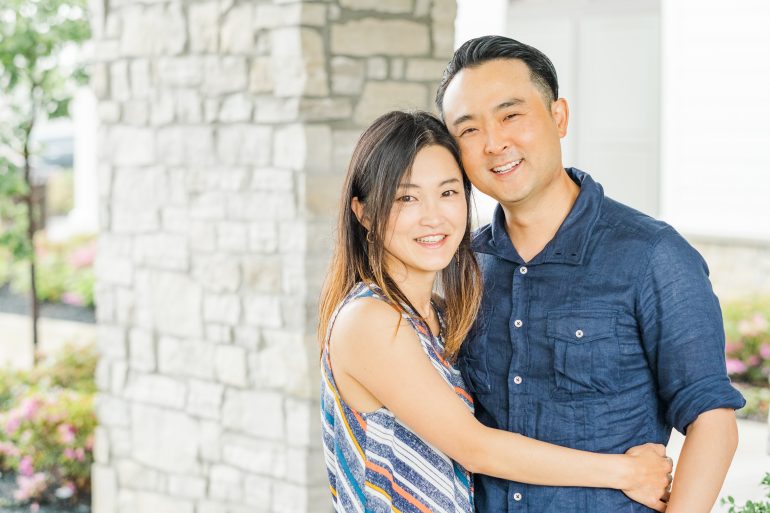During a chilly December walk on the grounds of the National World War I Museum and Memorial, Duke Lee stopped, kneeled, and asked Rena Ishii for her hand in marriage.
The proposal did not come as a huge surprise. Since Rena’s arrival in Town a year earlier, to fill a temporary post at the Kansas City Symphony, the couple had fallen seriously in love. They had even discussed marriage. But the Japanese-born violinist still found it amusing that Duke, an easygoing violist from Texas, would resort to such a well-worn American tradition to declare his intentions.

“She thought it was kind of cheesy that I actually went down on one knee,” said Duke with a laugh, as the three of us chatted recently over tea. “But yeah, it worked out.” Afterward, they treated themselves to dinner at Café Provence, and the following May at Loose Mansion they exchanged vows in front of a small gathering of family, friends from around the world, and Symphony colleagues.
Music brought them together, but their union was a long time in the making. They came from drastically different worlds. Rena spent the first two decades of her life in Kobe, the daughter of two school teachers. As a teenager, she experienced the horrific earthquake of 1995. Family members lost homes, friends lost loved ones. “The sight of my destroyed hometown was heartbreaking,” she said.
After studying violin briefly in Tokyo’s insular music scene, Rena was relieved to come to The United States in 2001, where she earned bachelor’s and master’s degrees at the University of Cincinnati’s College-Conservatory of Music and sought further studies at the Cleveland Institute of Music.
Duke received perhaps a more typically American upbringing, filled with Houston traffic and Texas football. His father was an architect. His parents, having immigrated from Korea before Duke was born, encouraged him and his sister to study music even though they themselves were not musicians.
And study they did. Duke benefited from the Rice University/Shepherd School of Music’s superlative string faculty throughout high school. He began on violin, but “there was a shortage of violas in the ensemble,” he said. One day, Rice’s Kenneth Goldsmith suggested he try the viola. “I had success with it right away.”
Duke earned a bachelor’s degree at Ohio’s Oberlin Conservatory of Music and a master’s degree at the Juilliard School of Music. He was a fellow at Miami’s New World Symphony before joining the Kansas City Symphony in 2006, shortly after Michael Stern’s arrival as music director. Five years later, Rena walked into his life, appearing in a Symphony rehearsal one autumn day in 2011 to join the violin section.
Orchestra circles are small, so it was a bit of a miracle that the two hadn’t met before this. But when Duke and Rena held their first extended conversation, during a party at a Symphony colleague’s Roeland Park home, they felt an instant comfort level that quickly grew into a close friendship. “We are not social butterflies,” Rena said. “We prefer one-on-one interaction to parties.”

Falling in love is a complicated thing, but among other things it implies a common worldview. “It was kind of like a shared temperament,” Rena said of that first conversation, alone on the deck of their friend’s house. “Neither of us was super-talkative. But we kind of listened to each other. It wasn’t like either of us was talking ‘at’ the other, we were just calmly talking there on the deck.”
For musicians, a “meeting of the minds” also means discovering that you agree on musical things, in addition to any romantic feelings you might be harboring. “We have similar opinions,” Rena said. “We usually like the same conductors, or we usually think the same violinist is awesome. So, during the car rides home, we always talk about what we thought about the concert: How it went, who we liked.”
The couple’s first challenge was getting Rena through the audition process so she could hold a permanent position in the Symphony. Duke served as her “audition coach” – After five years in Kansas City (he is currently acting assistant principal violist), he had a general sense for what the committee would be listening for in the “blind audition.”
“Auditioning is really hard,” Rena said of the process of competing against dozens of the nation’s best musicians. “You can’t imagine how stressful it is.” Rena was in fact already tentatively planning to move back to Cleveland, or even Japan, after the Kansas City post expired. “Then I met him, and… at that point, our goal was for me to win the audition.”
In March 2013, she nabbed the permanent post. Two months later they married, and within a year their “happily ever after” began with the birth of Leon, who is now seven. Next came Anton, now five, and Owen, age two. Then two years ago Rena’s parents, Shunji and Miwa, moved from Japan to live with the couple and help care for the boys.

Music is still central in the household. Leon and Anton are making substantial progress on the violin. “We tried to push for different instruments,” Rena said. “But they are so used to seeing us do this. They were like: No, no, no, we want to do what you do.” The couple also tries to allot some time for exercise each day, and the boys are taking taekwondo.
It is like-mindedness that has allowed the couple to flourish. Yet each quietly admits to differences, and these are often the very traits they love most about each other.
“One thing I love and respect is her sense of priorities,” Duke said. “Her head is screwed on right. She’s definitely family-first, but she also just wants to be a good, respectful human being… to do what’s right.”
Duke was 26 when he arrived in Kansas City, “but I was mentally a kid,” he said. “I became an adult here.” Rena remembers Duke’s warm, respectful manner, and his attentiveness. “He has always paid attention to what I need,” she said. “And his natural patience has proven invaluable for parenting.”
“I love the way that he is with our kids,” Rena said. “As a father he is very dedicated and devoted.” While Duke’s laid-back approach might have frustrated her initially, they have learned to meet in the middle. “I’m very impatient, I want results right away,” Rena said. “He taught me to do things in a way so that, while things might not happen right away, it is probably more effective over a longer time frame.”
Rena and Duke joined a half-dozen other couples at the Kansas City Symphony when they tied the knot: a surprisingly common phenomenon. Because of the cloistered nature of a classical musician’s day-to-day activities, in almost any American orchestra you will find a handful of wedded couples.
“An orchestra musician is such a specific breed of human being,” Duke said. “So we generally gravitate toward each other, because we understand each other. We know what we’ve had to go through.” Plus, he added, people whose work activities are focused primarily on weekend evenings “are not going out on Friday and Saturday nights. We’re not hitting the bars.”
At the most fundamental level, Rena and Duke have succeeded because they share a worldview, one in which music and family are uppermost. “My core values align with hers,” Duke said. “That’s why this has worked.”
Also featured in the July 10, 2021 issue of The Independent
Photo Credit: Bailey Pianalto Photography
By Paul Horsley